Donate Now
Volunteer Today
The ahug Foundation Story
When my son Cason was diagnosed at nearly 3 years old, I was blindsided. I spent many nights feeling alone wondering what kind of future my son could have (Will he talk? Will he want to be touched?), and honestly blaming myself. I did not know where to turn to understand Autism because there is so much information AND misinformation out there.


It was scary, but I was blessed to have a supportive family by my side who were already on the journey with a child diagnosed with Autism. They provided information on many things that affect our lives everyday like education, medical care, financial support and so much more. My family was a warm comfort to me at a time when I felt like my world had been turned upside down. I wanted to offer this same support to other families and, in 2018, founded the ahug Foundation, which stands for “Autism, Helping You Grow.” We are here for you – as supporters, as a resource for any need, and as a place to find a community.
I hope that stopping by has left you knowing that you are not alone, and we are here for you and your child!
Teri
Founder and Mom of Cason
A Few Facts
I began this journey with limited information about what the future held for my son and my family. Here are some facts about Autism Spectrum Disorder to help you care for your child:
- ASD affects about 1 in 68 children in the United States, with more children identified than ever before.
- ASD is about 4 times more likely in boys than girls.
- ASD affects children of all racial, ethnic, and socioeconomic groups.
- ASD is a spectrum disorder, which means that every child with ASD has different skills, challenges, and needs.
- While we do not know all of the causes of ASD, we have learned that there are likely many contributing factors, including genes, early brain development, and the environment.
- ASD can be reliably diagnosed by age 2, but children may be diagnosed at earlier ages.
- African-American and Hispanic children are diagnosed far later than Caucasian children.
- Early identification of ASD helps children get the services they need.
- There is no “cure” for ASD, but there are several interventions that can help children learn important skills that improve everyday life.
- Typically, the earlier children are diagnosed and receive services, the better their outcomes are.
- Roughly half, or 48%, of children with an ASD attempt to wander from a safe environment, a rate nearly four times higher than their unaffected siblings
- Accidental drowning accounted for 91% total U.S. deaths of those with an ASD from 2009-2011.
- However, aquatic activities and hydrotherapy have been shown to increase social interaction, confidence, and independence in children with ASD.
- Autism-related costs average $60,000 a year per family.
- Children with ASD can learn and succeed in the classroom and beyond. Like every child, with the help of their families, providers, doctors, specialists, and communities, kids with ASD can thrive.
Sponsor or Volunteer
If you can and would like to help families with Autism either as a volunteer or a sponsor, we’d love your help.
